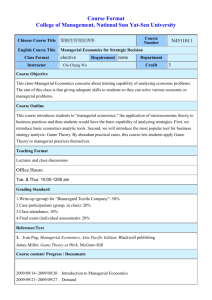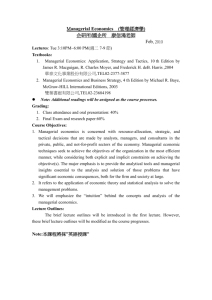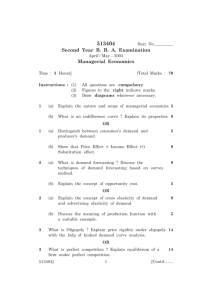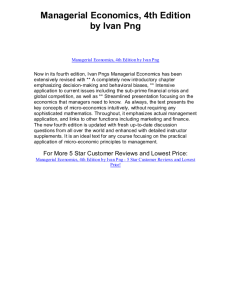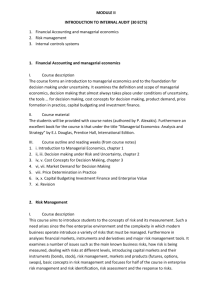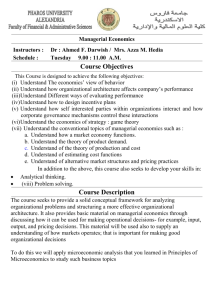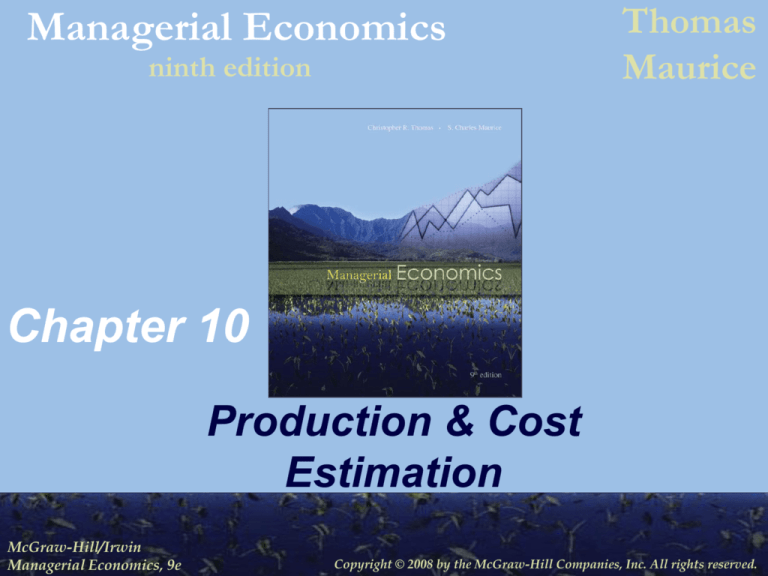
Managerial Economics
ninth edition
Thomas
Maurice
Chapter 10
Production & Cost
Estimation
McGraw-Hill/Irwin
McGraw-Hill/Irwin
Managerial Economics, 9e
Managerial Economics, 9e
Copyright © 2008 by the McGraw-Hill Companies, Inc. All rights reserved.
Managerial Economics
Empirical Production Function
• Cubic empirical specification for a
short-run production function is
derived from a long-run cubic
production function
• Cubic form of the long-run
production function is expressed as
Q aK L bK L
3
10-2
3
2
2
Managerial Economics
Properties of a Short-Run Cubic
Production Function
Q AL BL
3
2
• Holding capital constant, short-run
cubic production function is
derived as follows:
Q aK L bK L
3
2
AL BL
3
3
2
2
Where A aK 3 and B bK 2
10-3
Managerial Economics
Properties of a Short-Run Cubic
Production Function
Q AL BL
3
2
• The average & marginal products
of labor are, respectively:
AP Q L AL BL
2
MP Q L 3AL 2BL
2
10-4
Managerial Economics
Properties of a Short-Run Cubic
Production Function
Q AL BL
3
2
• Marginal product of labor begins to
diminish beyond Lm units of labor
• Average product of labor begins to
diminish beyond La units of labor
B
Lm
3A
10-5
B
and La
2A
Managerial Economics
MP & AP Curves for the Short-Run
Cubic Production Function (Figure 10.1)
Q = AL3 + BL2
10-6
Managerial Economics
Properties of a Short-Run Cubic
Production Function
Q AL BL
3
2
• To have necessary properties of a
production function, parameters
must satisfy the following
restrictions:
A 0 and B 0
10-7
Managerial Economics
Estimation of a Short-Run
Production Function
• To use linear regression analysis, the
cubic equation must be transformed
into linear form
• Q = AX + BW
• Where X = L3 and W = L2
• Estimated regression line must pass
through the origin
• Specify in computer routine
10-8
Managerial Economics
Estimation of a Short-Run Cost
Function
• Estimate using data for which the level of
usage of one or more inputs is fixed
• Usually time series data are used
• Data collection may be complicated by the
fact that accounting data do not include
firm’s opportunity costs
• Capital costs should reflect not only acquisition
cost but any foregone rental income,
depreciation, & capital gains/losses
• Must eliminate effects of inflation
• Divide by appropriate price index
10-9
Managerial Economics
Properties of a Short-Run Cubic
Cost Function
TVC aQ bQ cQ
2
3
• Average variable cost & marginal
cost functions are, respectively:
AVC a bQ cQ 2
SMC a 2bQ 3cQ
10-10
2
Managerial Economics
Properties of a Short-Run Cubic
Cost Function
TVC aQ bQ cQ
2
3
• Average variable cost reaches its
minimum value at:
Qm b 2c
• To conform to theoretical
properties, parameters must satisfy
the following restrictions:
a 0 , b 0 , and c 0
10-11
Managerial Economics
Properties of a Short-Run Cost
Function
• Cubic specification produces
S-shaped TVC curve & U-shaped AVC
& SMC curves
• All three cost curves employ the same
parameters
• Only necessary to estimate one of these
functions to obtain estimates of all three
• In the short-run cubic specification,
input prices are assumed constant
• Not explicitly included in cost equation
10-12
Managerial Economics
Summary of Short-Run Empirical
Production Functions
Short-run cubic
production equations
Total product
Average product of labor
AP AL BL
Marginal product of labor
MP 3 AL2 2 BL
Diminishing marginal
returns
begin at Lm
Restrictions on
parameters
10-13
Q AL3 BL2
2
B
3A
A 0 and B 0
Managerial Economics
Summary of Short-Run Empirical
Cost Functions
Short-run cubic
cost equations
Total variable cost
Average variable cost
Marginal cost
Average variable cost
reaches minimum at
Restrictions on
parameters
10-14
TVC aQ bQ 2 cQ 3
AVC a bQ cQ 2
SMC a 2bQ 3cQ 2
b
Qm
2c
a 0, b 0, c 0

